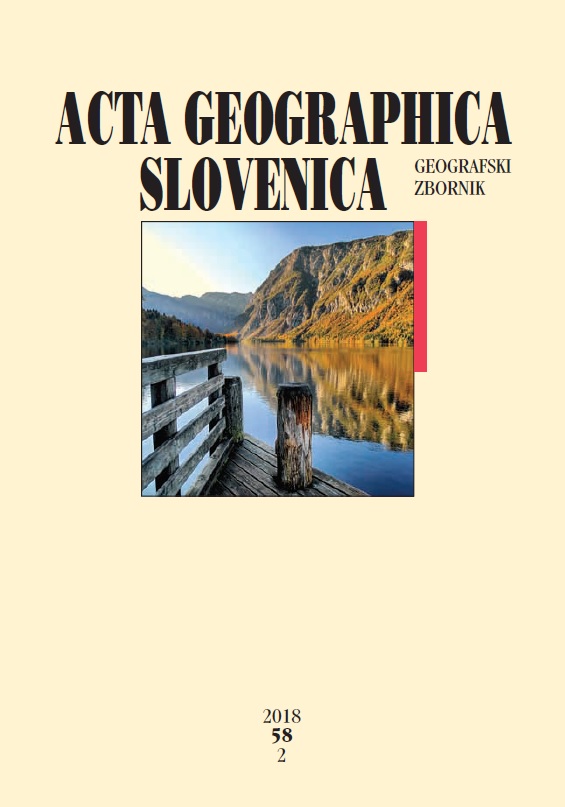Vzhodnoevropska mesta kot središča vodenja in upravljanja med gospodarsko krizo
DOI:
https://doi.org/10.3986/AGS.3124Ključne besede:
ekonomska geografija, gospodarska družba, sedež, funkcija vodenja in upravljanja, Deloitte, Vzhodna EvropaPovzetek
V članku avtorji opisujejo funkcijo vodenja in upravljanja vzhodnoevropskih mest na podlagi finančne uspešnosti največjih gospodarskih družb, ki imajo sedež v tej regiji, ter vpliv izbranih sektorjev na to funkcijo. Raziskava je pokazala, da so se neto dohodki preučevanih podjetij kljub svetovni gospodarski krizi med letoma 2008 in 2012 še nekoliko povečali. Trenutno sta najmočnejši »središči vodenja in upravljanja« v Vzhodni Evropi Varšava in Praga. Sektorja, ki najmočneje vplivata na regionalno funkcijo vodenja in upravljanja v Vzhodni Evropi, sta prevozništvo in sektor izdelkov za široko rabo. Zaradi gospodarske krize se je v Vzhodni Evropi oblikoval tudi geografski vzorec, ki se ne ujema s trenutnimi svetovnimi trendi: težnja podjetij v tej regiji je, da trenutno svoje sedeže zgoščajo v manj mestih, kar postaja vse bolj značilno tudi drugod po svetu. Avtorji v članku za vsako preučevano gospodarsko družbo uporabljajo metodo standardizacije, ki temelji na povprečju in standard nem odklonu finančnih vrednosti.
Prenosi
Literatura
Alderson, A. S., Beckfield, J. 2004: Power and position in the world city system. American Journal of Sociology 109-4. DOI: https://doi.org/10.1086/378930
Anttiroiko, A. V. 2015: City branding as a response to global intercity competition. Growth and Change 46-2. DOI: https://doi.org/10.1111/grow.12085
Brozzi, R. Lapuh, L., Nared, J., Streifeneder, T. 2015: Towards more resilient economies in Alpine regions. Acta geographica Slovenica 55-2. DOI: https://doi.org/10.3986/AGS.916
Csomós, G. 2012: GaWC Data Set 26: global command and control centres, 2006/2009/2012. Internet: http://www.lboro.ac.uk (15. 3. 2015).
Csomós, G. 2013: The command and control centers of the United States (2006/2012): An analysis of industry sectors influencing the position of cities. Geoforum 12-50. DOI: https://doi.org/10.1016/j.geoforum.2013.09.015.
Csomós, G. 2015: The Ranking of Cities as Centres of the Hungarian Economy, 1992-2012. Regional Statistics 1-5. DOI: https://doi.org/10.15196/RS05104
Csomós, G., Derudder, B., 2014: European cities as command and control centres, 2006-11. European Urban and Regional Studies 21-3. DOI: https://doi.org/10.1177/0969776412453149
Deloitte Central Europe Top 500 report, 2014. Internet: www.deloitte.com (15. 10. 2014).
Dorocki, S., Boguś, M. 2014: Regional variety of biotechnology development in Asia. Procedia - Social and Behavioral Sciences 120. DOI: https://doi.org/10.1016/j.sbspro.2014.02.097
Duranton, G., Puga, D. 2000: Diversity and specialisation in cities: why, where and when does it matter? Urban Studies 37-3.
Friedmann, J., Wolff, G. 1982: World city formation: an agenda for research and action (urbanization process). International Journal of Urban & Regional Research 6-3. https://doi.org/10.1111/j.1468-2427.1982.tb00384.x
Friedmann, J. 1986: The world city hypothesis. Development and Change 17-1. DOI: https://doi.org/10.1111/j.1467-7660.1986.tb00231.x
Froot, K. A. 1994: Foreign direct investment in eastern Europe: some economic considerations. Transition in Eastern Europe 2. Chicago.
Gierańczyk, W., Rachwał, T. 2012: Structural changes in the industry of Poland against the background of eastern European Union states. Quaestiones Geographicae 31-2.
Hall, P. 1966: The World Cities. London. DOI: https://doi.org/10.1080/00420989120080651
Internet 1: Gawc www.lboro.ac.uk (15. 3. 2015).
Internet 2: Forbes www.forbes.com (15. 3. 2015).
Internet 3: Deloitte www.deloitte.com (15. 3. 2015).
Jakóbczyk-Gryszkiewicz, J. 2011: Łódź u progu XX wieku. Studia Miejskie 4.
Kincses, Á., Nagy, Z., Tóth, G. 2013: The spatial structures of Europe. Acta Geographica Slovenica 53-1. DOI: https://doi.org/10.3986/AGS53103
Lorber, L. 1999: The economic transition of Slovenia in the process of globalisation. Geografski zbornik 39.
Lyons, D., Salmon, S. 1995: World cities, multinational corporations, and urban hierarchy: the case of the United States. World cities in a World-system. Cambridge.
Rachwał, T. 2011: Industrial restructuring in Poland and other European Union states in the era of economic globalization. Procedia. Social and Behavioral Sciences 19. DOI: https://doi.org/10.1016/j.sbspro.2011.05.100.
Rachwał, T., Boguś, M. 2012: The competitiveness of industrial enterprises in European Union Countries. Current problems of competitiveness improvement in national economies and enterprises..
Ravbar, M. 2009: Economic geographical assesment of investments – a development factor in regional development. Acta geographica Slovenica 49-1. DOI: https://doi.org/10.3986/AGS49105
Raźniak, P. 2014: City’s position in international rankings and quality of offered tourist service. Tourism: An International Interdisciplinary Journal 62-2.
Raźniak, P., Winiarczyk-Raźniak, A. 2015: Did the 2008 global economic crisis affect large firms in Europe? Acta Geographica Slovenica 55-1. DOI: https://doi.org/10.3986/AGS.740.
Raźniak, P., Winiarczyk-Raźniak, A., Nowotnik, D. 2015: Central and Eastern European Cities in globalized world. Socio-Economic Problems and the State 12-1.
Sassen, S. 1991: The Global City: New York, London, Tokyo. Princeton.
Sassen, S. 2006: Cities in a world economy. Thousand Oaks.
Śleszyński, P. 2007: Gospodarcze funkcje kontrolne w przestrzenie Polski. Prace Geograficzne 213.
Taylor, P. J. 2004: World city network: a global urban analysis. London.
Taylor, P. J., Csomós, G. 2012: Cities as control and command centres: Analysis and interpretation. Cities 29-6. DOI: https://doi.org/10.1016/j.cities.2011.09.005
Wójtowicz, M., Dorocki, S. 2014: Regional differences in the development of the biotechnology industry in Latin America, with particular emphasis on Brazil and Mexico. Environmental and socio-economic transformations in developing areas as the effect of globalization. Krakow.
Prenosi
Objavljeno
Kako citirati
Številka
Rubrike
Licenca
Avtorske pravice (c) 2018 Piotr Raźniak, Sławomir Dorocki, Anna Winiarczyk-Raźniak

To delo je licencirano pod Creative Commons Priznanje avtorstva-Nekomercialno-Brez predelav 4.0 mednarodno licenco.









